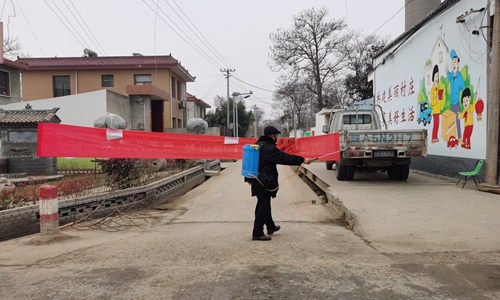HOME >> SOURCE,SPECIAL-COVERAGE
China needs to prepare for consequences of virus
Source:Global Times Published: 2020/1/30 22:43:40

A Miaoxi village official from Northwest China's Shaanxi Province sprays disinfectants on the road and buildings. Photo: Li Lei/GT
As China is concentrating all efforts in fighting against the outbreak of the novel coronavirus (2019-nCoV), the central government should also be alert to and make preparations for the inevitable economic decline.
Given the devastating impact of the epidemic outbreak on consumption, which is the primary engine of economic growth, the Chinese economy is expected to face growing downward pressure in the short term. Zhang Ming, an economist with the Chinese Academy of Social Sciences, said in a recent report that China's GDP growth may drop to 5 percent or even lower due to virus onslaught.
As a result, observers generally believe the government will maintain a loose monetary policy and roll out proactive fiscal policies to boost confidence at least in the first quarter. But that may be not enough, and a more comprehensive approach is needed when it comes to being ready for the economic slide.
For instance, while financial authorities have decided to delay market opening on the Shanghai and Shenzhen stock exchanges to avoid a likelihood caused by panic selling, more measures to stabilize the financial markets are urgently needed.
Of course, the immediate priority is to contain the spread of the 2019-nCoV. Whether China can put the epidemic under control in the coming month will directly affect the survival of the country's massive small- and medium-sized enterprises (SME).
Whether in the manufacturing or services sector, there is no denying that the outbreak has had a huge impact on the production and operation of enterprises, which are likely to see stagnant business in the months to come. Large-scale companies may be able to pull through this difficult time with their deep pockets, but for SMEs, especially those in the services sector, the financial test will be severe. If a substantial number fail to survive, employment will be hit, which in turn will weigh down consumption further, consequently forming a vicious circle for the entire economy.
In this sense, economic consequences of the epidemic outbreak are inevitable, but whether the impact will be short term or long term still depends on the measures authorities will take.
Most importantly, the authorities need to make preparations for the upcoming economic downturn urgently. While at the beginning of the 2019-nCoV outbreak, many thought it would not be as serious as the Severe Acute Respiratory Syndrome (SARS), it turns out that China has more novel coronavirus cases than SARS cases. And unlike the SARS outbreak in 2003 when the Chinese economy was on an obvious upward trend after its accession to the WTO, China is facing great challenges from both home and abroad.
For instance, the Trump administration does not intend to lift the pressure on China. White House trade advisor Peter Navarro said Wednesday that the US would not remove tariffs on Chinese imports even if the novel coronavirus hurts the Chinese economy.
In short, the authorities' imperative must be to face the reality, prepare for the worst and work for the best.
Posted in: GT VOICE